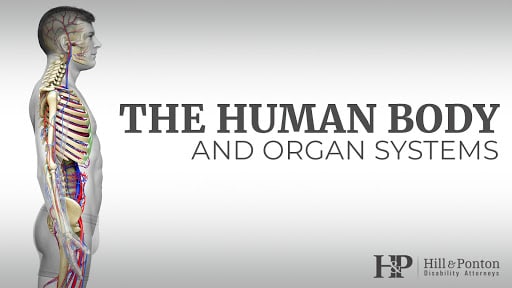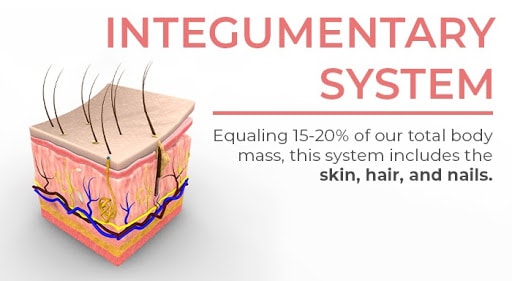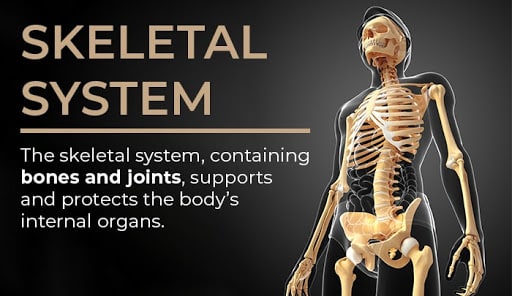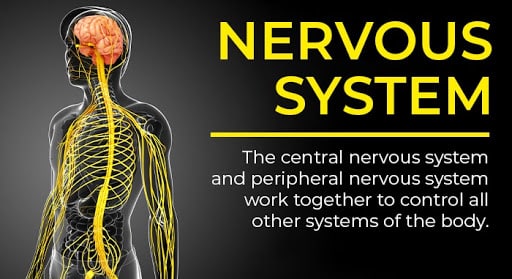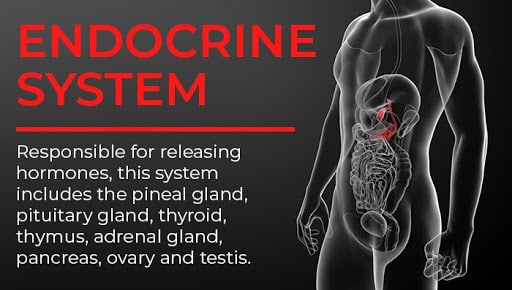Human Body Organ Systems
The organ systems of the human body all have specific functions. The VA uses the categories of major organ systems to classify disability claims. Here, we will break down how the different organ systems match up with the VA’s disability systems.
How Are Organ Systems Connected to VA Disability Ratings?
Our bodies are made up of 11 basic organ systems that manage all the essential body functions. These systems, while interdependent, can become out of tune. When one is not functioning properly, the others will attempt to correct the problem. All the systems will work together to try to create what is known as homeostasis or a state of balance within the body.
The 11 organ systems include the integumentary system, skeletal system, muscular system, lymphatic system, respiratory system, digestive system, nervous system, endocrine system, cardiovascular system, urinary system, and reproductive systems.
The VA defines 14 disability systems, which are similar to the body systems. However, the disability systems are separated differently for rating purposes. These systems are listed with the medical listing and are identified independently when necessary.
These 14 systems are the Musculoskeletal system; Organs of Special Sense (optical); Auditory; Infectious Diseases, Immune Disorders, and Nutritional Deficiencies; Respiratory system; Cardiovascular system; Digestive system; Genitourinary System; Hemic and Lymphatic system; Skin; Endocrine system; Neurological conditions; Mental Disorders, and Dental and Oral conditions.
For Individual Unemployability ratings; if you are rated with more than one disability within one body system, your rating will increase towards unemployability. For this reason, we have outlined the VA defined body systems and have included a link to our VA Unemployability Calculator so you can see if your ratings make you eligible for Individual Unemployment.
Below is a description of the basic functions of each system as well as some of the diseases and disorders associated with each system. These lists are not complete and do not take the place of medical advice.
How Does The VA Categorize Disability Claims?
Integumentary System (Skin, Hair, Nails)
VA Equivalent for rating – The Skin
The integumentary system is the largest organ of the body, equaling 15-20% of our total body mass. It acts as a barrier to physical, chemical, and biological agents. The skin prevents water loss and regulates body temperature. It transmits the senses of touch, pain, and pleasure and maintains body temperature by secreting sweat. The hair lubricates the scalp, which secretes pheromones and cools or warms our heads. The nails protect our fingers, which are a major tool used for protecting ourselves and providing ourselves with food, shelter, and sensations. The skin leaves us most vulnerable when it is compromised by open wounds, allowing infectious agents into the body.
The VA notes diseases and disorders associated with the skin to include acne, and chloracne; dermatitis/eczema; hives; lupus; psoriasis and other autoimmune disorders; diseases affecting keratin, pores and hair; cancer and tumors of the skin such as melanomas and basal cell carcinoma.
Musculoskeletal System
The VA Musculoskeletal System includes both systems below:
Skeletal System (Bones, Joints)
The skeletal system supports and protects the body’s internal organs. The ribs protect the abdominal organs, which are both vulnerable to injury and dangerous to our well being when injured. The skull protects our brain which controls all functions of our bodies and minds. The skeleton provides the framework and shape to our bodies. It also connects to our major muscles to allow movement. Bones store minerals such as calcium and create blood cells in the soft bone tissue called marrow. Bones can break easily without enough calcium and are subject to such diseases as arthritis; cancers; scoliosis; osteoporosis, gout; bursitis; fractures and breaks; and amputations.
Muscular system (Cardiac, Smooth, and Skeletal Muscles)
- Cardiac muscles are found in the heart and power the actions that maintain blood flow through our body;
- Smooth, or involuntary muscles are found in the heart and organs, they surround the internal organs and are responsible for their movement such as moving food through the digestive tract; and
- Skeletal, or voluntary muscles, are responsible for carrying out the actions and movements caused by messages sent from our brains through our nervous system. Skeletal muscles are also responsible for maintaining posture and producing heat. When muscles lack appropriate levels of oxygen they can cramp and tear, creating pain. When not used they can atrophy and become useless. Diseases and disorders of the muscular system include muscular dystrophy; fibromyalgia; tendonitis; multiple sclerosis; and muscle strain or sprains; hernias.
Lymphatic System (Red Bone Marrow, Thymus, Lymphatic Vessels, Thoracic Duct, Spleen, Lymph Nodes)
VA Equivalent for rating – Hemic & Lymphatic System (for VA rating this system also includes blood)
This system transports clean fluids in our body back to the blood and drains excess fluids and debris from the tissues and cells of the body. It also houses the white blood cells (lymphocytes) involved in protecting our bodies from infection. Diseases and disorders specific to the lymphatic system include anemias; leukemia; tuberculosis of the lymph nodes; Hodgkin’s disease; and other blood disorders.
Respiratory System – (Nasal Cavity, Pharynx, Larynx, Trachea, Bronchus, Lung)
This system maintains our breathing. It supplies the body with oxygen for cellular respiration by collecting oxygen in the lungs and disposes of carbon dioxide by breathing out the waste product. It also provides our functions of speech and smell. Diseases and disorders of the respiratory system include allergies; rhinitis and sinusitis; laryngitis; COPD; pleurisy; bronchitis; emphysema; asthma; sarcoidosis; fibrosis; asbestosis; pulmonary vascular diseases; fungal or bacterial infections of the lungs; sleep apnea; tuberculosis of the respiratory system; and lung, throat, and other respiratory cancers.
Digestive system (Oral Cavity, Esophagus, Liver, Stomach, Small Intestine, Large Intestine, Rectum, Anus)
Beginning with our mouths, this system is responsible for the breaking down and absorption of nutrients and the elimination of the waste not utilized by the body. It is responsible for identifying which minerals, vitamins, and other essentials from the foods we eat can be absorbed and utilized or stored by the body and which are to be disposed of, and carrying out those functions. Diseases and disorders of the digestive system include diverticulitis; gastritis; pancreatitis; cholecystitis; cirrhosis; hepatitis; liver cancer; irritable bowel or colon syndromes; hemorrhoids ; Crohn’s disease and ulcerative colitis.
Nervous System– (Brain, Spinal Cord, Nerves)
This system is actually made up of two distinct parts; the central nervous system (CNS) and the peripheral nervous system. The central nervous system is made up of the brain and spinal cord, and the peripheral nervous system is made up of all the nerves that lead into and out of the CNS to other parts of the body. The entire nervous system controls all of the other systems of the body, such as digestion and cardiac rhythm, and responds to internal and external changes, such as activating muscles and breathing. It also transmits information to the brain, such as pain and external sensations.
Diseases and disorders of the nervous system include paralysis; Parkinson’s Disease; palsy, embolisms; thrombosis; arteriosclerosis; polio; myelitis; ALS; meningitis; Multiple Sclerosis; muscular tics; Huntington’s Disease; cancers of the brain, spinal cord or nerves; epilepsy, seizure disorders; narcolepsy; migraine headaches; peripheral neuropathy; and traumatic brain injury.
Endocrine System– (Pineal Gland, Pituitary Gland, Thyroid Gland, Thymus, Adrenal Gland, Pancreas, Ovary, Testis)
For VA Rating: (not included are the ovaries and testis)
The glands of the endocrine system secrete chemicals called hormones that regulate most of the processes in our bodies such as growth, reproduction, metabolism, and even the control of the amount of glucose in our blood. Diseases and disorders of the endocrine system include Type 1 & Type 2 Diabetes, hypoglycemia, Addison’s disease; Cushing’s syndrome; hyper/hypothyroidism, thyroid cancer; and other active cancers of the endocrine glands.
Cardiovascular (Circulatory) System– (Heart, Blood Vessels)
The heart, made of cardiac muscle, pumps blood and blood vessels such as arteries and veins, transport the blood to every part of our body providing organs and muscles with nourishment. The blood carries oxygen, carbon dioxide, nutrients, waste and more throughout the body. Diseases and disorders associated with the cardiovascular system include myocardial infarction; coronary bypass surgery; arrhythmias; valve replacements; pacemakers; transplants; heart diseases (ischemic; hypertensive; arteriosclerotic); hypertension; aneurysms; fistulas; arteriosclerosis; anaphylaxis shock; varicose veins; cold weather injuries; and sarcomas of the blood vessels.
Urinary system (Kidney, Ureter, Urinary Bladder, Urethra)
VA Equivalent for rating – The Genitourinary System ( also includes: prostate gland, penis, testis, scrotum, ductus deferens)
This system is responsible for eliminating waste products of metabolism and other materials from the body that are of no use. The system is also responsible for maintaining the balanced fluid volume in our bodies by regulating the amount of water that is excreted, maintaining the concentrations of electrolytes, and normal pH levels of the blood. Diseases and disorders of the urinary system include nephrosis, bladder cancer, urethritis, bedwetting (enuresis), urinary and kidney stones and infections, renal failure, urinary incontinence, blood in the urine, and interstitial cystitis.
Reproductive Systems
MALE (prostate gland, penis, testis, scrotum, ductus deferens)
FEMALE (Mammary glands, ovary, uterus, vagina, fallopian tube)
VA Equivalent for rating – Female Reproductive System
(Male reproductive system is under Genitourinary system)
The reproductive system mainly functions to create human life. Ovaries produce female sex hormones and eggs. Eggs are fertilized in the fallopian tube by sperm then travel to the uterus, which provides the site for growth. The mammary glands produce milk for the newborn. Diseases and disorders associated with the female reproductive systems include breast cancer, removal of breast or lumpectomy; hysterectomy; pregnancy complications; endometriosis; ovarian or cervical cancers; and diseases or injuries of the vulva, vagina, cervix, uterus, fallopian tubes, or ovaries.
VA Additional Systems
The VA includes several other categories for disability claims that are more specific than or outside of the 11 main organ systems of the human body. These additional systems include:
Organs of Special Sense (eyes)
Diseases and disorders include any disturbances of field of vision; blurry vision; scotoma; muscle dysfunctions; intraocular hemorrhage; detachment of the retina; retinopathy; conjunctivitis; corneal conditions and transplants; aphakia; cataract; glaucoma; optic neuropathy; tear production issues; loss of eyelids, eyebrows, or lashes; tuberculosis of the eye, and cancers of the eye.
Impairment of Auditory Acuity (ears)
Diseases and disorders include hearing loss; tinnitus; chronic earaches; balance disorders; and cancers of the ear.
Mental Disorders (psychological issues)
Mental disorders have changed throughout the years so if your ratings are older than 2014; they may be listed as a different disorder or be rated by different criteria. Ask your attorney or VSO to look at your ratings and see if you are in need of an increased rating based on the changes in the rating system. Diseases and disorders under mental disorders include social impairments; anxiety; PTSD; obsessive-compulsive disorders; panic attacks; adjustment disorder; bipolar disorder; somatic disorders; depressive disorders; schizophrenia; schizoaffective disorder; delusional disorders; neuro-cognitive disorders; phobias; and eating disorders.
Infectious Diseases, Immune Disorders; and Nutritional Deficiencies
This includes the diseases and disorders such as cholera; leprosy; malaria; trench fever; plague, rheumatic fever; typhoid fever; lyme disease; HIV; syphilis; lupus; non-respiratory tuberculosis; and chronic fatigue syndrome.
Have Questions About Your Illness or Injury?
If you believe that the VA is categorizing or rating your disability incorrectly, contact the team at Hill & Ponton. Our veterans disability lawyers can assess your claim and help you obtain appropriate compensation.
